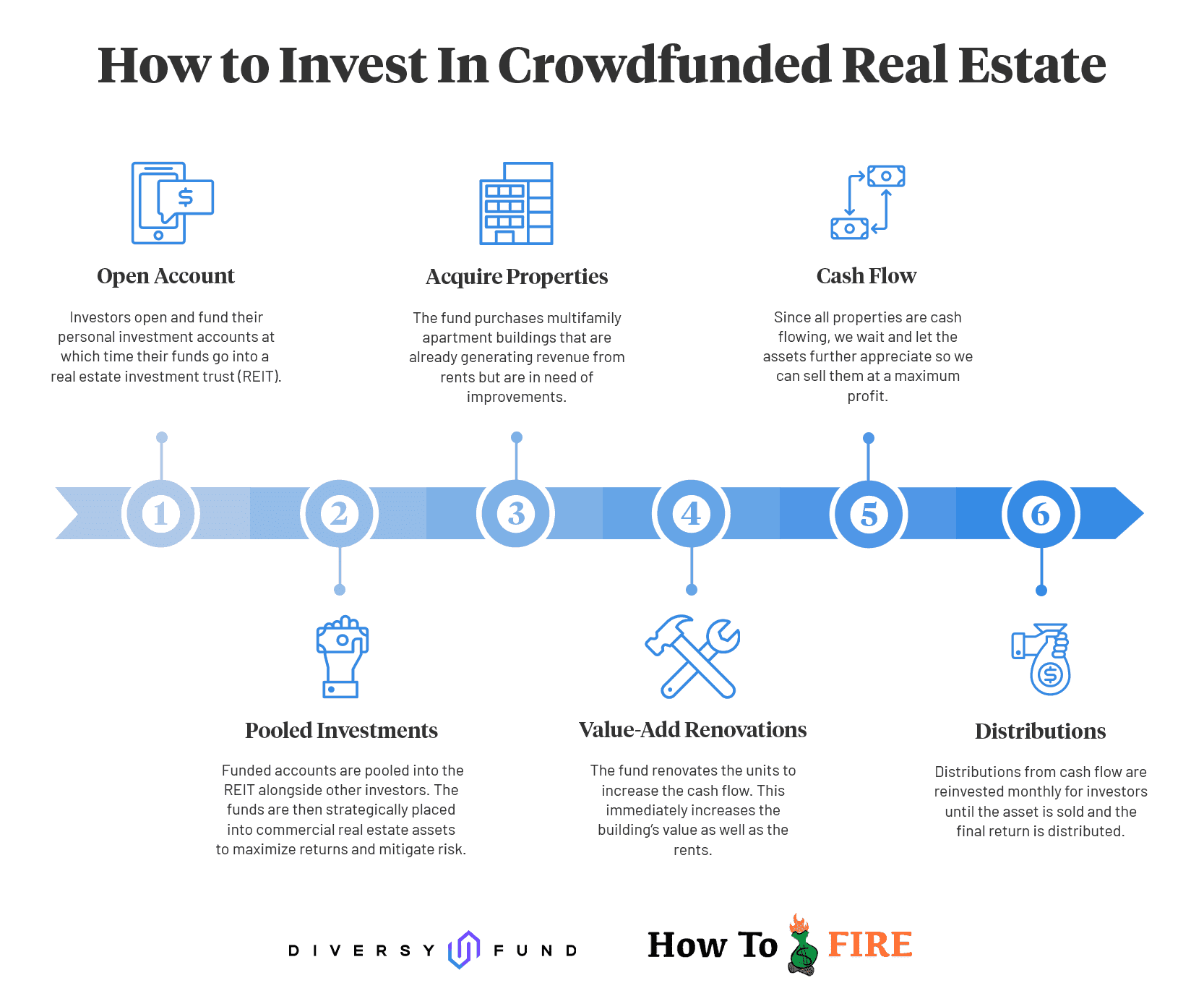Whether you’re an experienced investor or looking to dip your toes into the market for the first time, real estate investments are among the most stable and profitable solutions out there. REITs for beginners include many different kinds of properties that you can invest in.
For many investors, though, the real estate market poses dilemmas that cause significant stress to their mindset and finances. However, the concept of investing in REITs promises to provide a painless approach to real estate investment for investors of varying financial backgrounds.
Want to find out more about REIT investments and whether they are the right choice for you? Our guide to REITs for beginners will give you a clear idea of if they should become the next addition to your diversified portfolio.
Table of Contents
What are REIT Investments?
REITs, pronounced “reets,” are Real Estate Investment Trusts. They are companies that own and operate real estate to secure financial revenue. They work in the same way as a private investor, except they are funded by multiple investors, who will gain dividend income based on the overall revenue generated by the REIT.
Several companies facilitate REIT investment activities, with opportunities available for different property types, including residential, commercial, and multifamily. Many REIT companies specialize in one focused area of the real estate market, using that expertise to pinpoint the very best opportunities for maximum growth. However, some will provide a broad spectrum of coverage to support diverse portfolios.
Congress created REITs in 1960 as an amendment to the Cigar Excise Tax Extension. It enabled individual investors to buy shares in a commercial real estate portfolio to generate a passive income.
For a company to qualify as a REIT, it must:
- Invest at least 75% of its total assets in real estate
- Generate at least 75% of gross income from real estate (sales, interest, and rental collections)
- Illustrate a return of shareholder dividends equal to at least 90% of taxable income
- Have no more than 50% of shares owned by five or fewer people
- Boast at least 100 different shareholders (not applicable in year one)
From an investor’s perspective, REIT investments are transactions in which capital is tied up in endeavors conducted by the REIT company.
How Do REITs Work?
The basic model of REIT investments is relatively simple to understand and comprises of three main steps.
- The individual invests their capital in the REIT company
- The REIT company completes its various real estate investment work
- The REIT company divides profits amongst shareholders
To be considered a REIT company, the business must be a taxable corporation and boast a board of directors or trustees. While this basic premise remains standardized and consistent across the industry, it should be noted that there are various types of REIT investments for both commercial and residential investments.
Here are the types of REIT investments that you should know when investigating REITs for beginners.
Equity REIT
Being the most frequently used type of REIT investment, Equity REITs purchase properties (residential or commercial) and manage those properties to produce a source of revenue. The income arrives almost exclusively through rentals, although the occasional property sale is possible.
Mortgage REIT
Commonly referred to as mREITs, these entities facilitate loans and mortgages for real estate owners. Lending can extend to mortgage-backed securities (MBS). Revenue gained through this type of endeavor is through the interest incurred by the borrowers.
Hybrid REIT
The hybrid REIT is one in which the company’s portfolio will include both equity (physical assets) and mortgage (loan) elements. This means that revenue can be gained from rentals as well as interest, providing a diverse and versatile solution for shareholders.
Public Traded REIT
Public traded REITs deal with shares that are listed on the national securities exchange and are regulated by the U.S. Securities and Exchange Commission (SEC). This means that the shares in the real estate investment companies can be purchased and sold by individuals, similarly to other investments in their portfolio.
Public Non-Traded REIT
SEC still regulates non-public traded REITs, but they do not appear on the national securities list. They are less prone to market fluctuations, which can be viewed as a positive by many users.
Private REIT
A private REIT is neither regulated by the SEC nor available on the national securities list. They focus exclusively on private placement investments for select shareholders and investors rather than public endeavors. There are many REITs for beginners that are considered Private REITs.
DiversyFund is For You!
REITs are a hassle-free and cheaper way to invest in various types of real estate.
Click Here
What are Crowdfunded REIT Real Estate Investments?
Crowdfunding has become a phenomenon in recent years, influencing many aspects of business and the finance sectors. While the concept of gaining financial backing from members of the public is nothing new, the opportunities posed by online interactions make it easier than ever.
REITs that operate in this manner are usually private REITs that register with the SEC as exempt funds under the organization’s Regulation Crowdfunding structures. In a similar vein to other crowdfunding ventures, this allows people with smaller levels of capital to invest in real estate, opening a door that was previously opened only to the wealthy.
Crowdfunded REITs offer the same securities as other REIT operations. However, the crowdfunded arena allows smaller REIT companies to overcome many of the obstacles that would have previously stood in their way. From an investor’s perspective, this presents new investment opportunities, enabling them to compete with more prominent investors and tread previously closed pathways.
Even when individuals do not want to take this route, its presence has started a new chapter for the REIT investment marketplace.
Fundrise makes it easy for anyone to get started as a real estate investor. Available in all 50 states, started in 2010 - Fundrise has become one of the most popular eREIT investments available.
- Small Minimum Investment Requirement
- IRA Accounts Available
- Open to ALL Investors
- Variety of Investment Options
- User Friendly Platform
- Difficult to Understand Fee Structure
- Illiquid
- More Complex Investments Requiring Diligence of Investors
Why Should You Choose to Add a REIT to Your Portfolio?
Real estate investments facilitated by REIT companies are prevalent for investors of varying backgrounds and financial statuses. However, no one should jump in at the deep end without first understanding the reasons for doing so.
The are many incentives for choosing REIT investments. Here are the reasons why REITs for beginners will provide a painless real estate investing experience.
Versatility
As the different types of REIT activities detailed above highlight, there are many ways for investors to get involved with real estate investing through this type of platform. Whether your research suggests public or private, interest or rentals, targeted endeavors or diverse portfolios, doesn’t matter. With the right level of analysis, finding a suitable solution for budgets, personal preferences, and investment expectations should be possible.
Knowing that real estate investment activities can be tailored to suit your best interests instantly makes it a desirable proposition.
Convenience
For most people, real estate investments (or any investment) are a secondary source of income designed to build a better financial future. As such, a convenient process that offers easy access for the buying and selling of shares should be a priority. REITs provide a straightforward approach to investing. This convenience results in no headaches, no stress, and no distractions from your primary career and other life commitments.
Simplicity is tempting for investors, old and new. The easy access is supported by easy management so that you know exactly where things stand at all times.
Liquidity
Traditionally speaking, the long wait times and drawn-out processes to complete real estate transactions have been a major stumbling block for investors. The REIT approach to real estate investments removes this by injecting liquidity that increases transparency and stability throughout the procedures. The reliability that this brings from day one is an attractive prospect that many real estate shareholders enjoy.
Given that the cash flow and short-term obstacles often prevent investors from gaining the long-term benefits of the real estate market, this is a crucial factor.
Stable Returns
Dividends are paid based on acquired interest or rental charges (or both), which brings passive income continually. The risk-adjusted returns are particularly significant for investors wanting to gain greater control of their portfolio. The financial flexibility also allows individuals to test the waters of REIT investments as a whole or new additions to those REIT real estate investment endeavors.
This type of asset is a fantastic tool for diversification of overall portfolios that may include equities and bonds.
It’s Real Estate
Ultimately, one of the best features of REIT investments is that they serve as a gateway to physical real estate investments. The opportunity allows you to benefit from the many factors that make real estate investments so popular in the first place, without the substantial investment of time, money, and experience. Real estate is considered to be the number one investment opportunity by most people, and REITs for beginners is a starting point as the most practical approach.
Real estate is one of the few areas of investing where you’re unlikely ever to lose out. If it’s a choice between REIT investments or another arena, this choice is usually the best. However, keep in mind that there are no guarantees and that past performance is not an indicator of future results.
Professionalism
Whichever investment pathway you wish to utilize, the DIY approach offers great appeal but can lead to several pitfalls. With an expert that specializes in the field of interest, the hopes of unlocking the full potential of the investment opportunity are far higher. This is especially evident when considering the real estate investment arena, which is another reason to choose a REIT. They make their money by earning money on your (and other stakeholders’) behalf.
Aside from identifying the best opportunities to maximize your passive income, it prevents the threat of missing out on critical legal and logistical obligations.
Pros vs. Cons of REITs for Beginners
There are plenty of additional rewarding features to consider, but REIT investments are ultimately associated with convenience and flexibility. They are particularly suited for beginners due to external management and the ability to set the risk accordingly.
It’s important to factor in the negative features too, which are the management fees, non-tax-advantaged status, and limited capital appreciation due to the 90% dividends ruling. Nonetheless, these are easily outweighed by the incentives for actually investing in REITs.

What is the Cost and Earnings Potential for REITs?
The financial results will dictate the success and failure of any investment. As a new investor looking at the prospect of REIT investments, you will likely have two main questions:
- How much capital do I need?
- How much money can I expect to earn?
Cost of REITs
If you are planning to use traditional real estate investments, you’ll probably need six-figure savings or a mortgage to make it happen. However, with a REIT investment strategy, it’s possible to get started with just a few thousand dollars. You may even only have to invest a few hundred dollars. A flexible investing method, like the crowdfunding REIT strategy, makes this possible.
Conversely, there is no upper limit on how much you can invest. With REIT companies handling a wide range of projects and boasting extensive portfolios, they will not struggle to satisfy the demand.
Earnings of REITs
As for earning expectations, the monetary figure will depend upon the type of REIT for the investment. However, the most telling factor will be the level of capital used. After all, you cannot expect to generate one million dollars from a $500 investment.
Consequently, then, it’s best to think about passive income in terms of percentages. The following statistics offer clarity on expectation thresholds, as well as the incentives for choosing this approach in the first place.
- Over the last 150 years or so, housing investments have shown a return of 7.05 percent, compared to 6.89 percent for stocks and 2.5 percent for bonds.
- Real estate investments have also been shown to have less than half the risk attached to stocks and other transactions.
- Between 2013 and 2017, stock exchange-listed REITs produced compound annual total returns of 9.90%.
So, you can expect to see a pleasing return, as long as you take the right steps. Profits come continuously rather than at the end of a single transaction, as would often be the case with traditional real estate investments. The process ensures that the source of income can be enjoyed – or reinvested – with ease. REITs for beginners are a great option for this reason.
You May Also Like: Groundfloor Review 2023: Real Estate Investing for Everyone
The DiversyFund Approach to REIT Investment – Perfect for Beginners
If you’re planning to incorporate REIT investments into your portfolio and strategy, choosing the right pathway is essential. Crowdfunding a private REIT offers fantastic versatility and control, as well as earning potential. This is why they are now the preferred route for many investors. REITs are a particularly smart way for those that are new to the real estate investment arena to get started.
With many crowdfunded REITs available, finding the right one can feel like navigating a minefield. They each have their individual USPs, and DiversyFund is one that stands out as a particularly suitable solution.
The San Diego-based company promotes itself as “bringing wealth to the everyday investor,” and the following elements support those claims:
- Projected IRR returns of 17.3-18 percent
- Low minimum investment of just $500
- A focus on multifamily and student housing
- No platform fees
- Easy portfolio management
Perhaps the most notable feature, however, is that DiversyFund cuts out the middle man. While the majority of crowdfunded REIT companies outsource vital elements such as research, purchasing, and distribution, DiversyFund takes care of them in-house. As a result, DiversyFund has fewer hands to fill, meaning lower operating costs for them, as well as lower costs for investors.
DiversyFund’s in-house experts analyze the market to identify opportunities based on value, cash-flow, and growth before handling all aspects of management. A versatile range of properties allows investors to invest capital into the project(s) that suit their budget, timeframes, and financial expectations. The level of effort they put into their analysis allows these REITs for beginners to be a comfortable addition to any portfolio.
These characteristics make it one of the most eye-catching REIT investment services on the market. But, is it the right choice for your financial portfolio?

A Review of DiversyFund
DiversyFund was founded in 2016 by Craig Cecilio and Alan Lewis, and the company has already helped a large number of investors see positive returns. They are making great strides in the business of providing comprehensive real estate investment opportunities. DiversyFund focuses on simple transactions, and their high-quality real estate assets have disrupted the real estate investment landscape with seismic shifts.
There are many factors to consider as an investor before putting your money into an asset or REIT platform. Here’s everything you need to know about DiversyFund to make your decision a little easier.
Interested in DiversyFund?
Click here to learn about investing in real estate the modern way with only $500!
The User Experience
The user experience (UX) is a crucial ingredient in the recipe for success because it makes passive investment opportunities more convenient. It additionally reduces the threat of mistakes or confusion, which will also enhance your hopes of reaching the best possible outcomes for your finances.
DiversyFund sets out to be an ideal platform for REITs for beginners, and this is reflected very well by the layout of the site. Browsing different projects is an effortless task, enabling you to extrapolate the details needed to make a calculated decision. Likewise, the portfolio management portal brings a level of simplicity and transparency that isn’t matched by many of the alternative platforms on the market.
Financial Flexibility
Versatile investment opportunities are important in the eyes of beginners for many reasons. Firstly, you might not have unlimited amounts of capital earmarked for investing. Even if you do, likely, taking significant risks will not be a top priority on your agenda. Therefore, the opportunity to diversify your portfolio and enjoy trades that require only a few hundred dollars is highly advantageous.
The DiversyFund platforms are ideal because you can invest as little as $500. The exclusion of handling and management fees is particularly rewarding for smaller investments, too. After all, there’s nothing worse than losing the bulk of your returns due to hidden costs. The platform is transparent and ensures that even small-time investments are worthwhile.
Return Potential
While the real estate marketplace (mainly when using REITs) is significantly more stable than most sectors, there can still be variability between one platform and the next. The opportunities facilitated by the in-house experts at DiversyFund identify properties and projects that can sometimes fetch 18% returns. This rate is almost double what some of the others offer!
Frankly, this, combined with the reliability of the work due to its in-house approach, is the main incentive for choosing DiversyFund. The success of any investment is judged primarily by the financial outcomes, and this factor cannot be ignored. DiversyFund outperforms the chasing pack, making it an excellent option for REITs for beginners. You can invest and see results right away.
Stability
Liquidity is a key point of focus. DiversyFund works exclusively with cash flowing properties, which means that money is accrued through rentals, allowing you to see stable and reliable monthly returns. The cash flow is reinvested monthly for investors until the asset is sold or before the return is distributed.
The types of properties include multifamily and student properties, meaning occupancy levels are as close to 100% as possible. As such, all elements relating to the health of your capital and financial assets are in safe hands. As a beginning REIT investor, this is a particularly noteworthy reward as no one enjoys the thought of losing everything due to poor asset management – by a third party or otherwise.
Verdict
From the first impression to the financial possibilities and the general ease of managing your portfolio, the in-house approach offered by DiversyFund allows you to enjoy the rewarding features of REIT investments without the drawbacks of fees and similar obstacles. It is unquestionably one of the best platforms of its kind.
REITs for Beginners: Get Started Today with DiversyFund
Real estate investments remain the more attractive prospect of all investment opportunities due to their low risks, incredible stability, and the potential to outperform other strategies. As a beginner or someone without the capital needed to start dealing with properties single-handedly, the REIT pathway is the right pathway.
REIT investments allow stakeholders to build diverse portfolios with far smaller starting capital while leveraging success from the experience and professionalism of experts in the field. The steady returns, rather than waiting long periods to see any ROI as would be the case with traditional buying and selling of properties, is very useful too.
While there are many platforms available, DiversyFund stands out from the crowd – particularly for those seeking smaller minimum investments and low fees. For a convenient and stress-free investment strategy that offers estimated returns approaching the 20% mark, DiversyFund is one of the ultimate solutions of REITs for beginners and more experienced real estate investors alike.
Are you a real estate investor, or do you plan on dabbling into it? Do you utilize REITs or physical properties? Let us know in the comments!
Samantha Hawrylack is a personal finance expert and full-time entrepreneur with a passion for writing and SEO. She holds a Bachelor’s in Finance and Master’s in Business Administration and previously worked for Vanguard, where she held Series 7 and 63 licenses. Her work has been featured in publications like Grow, MSN, CNBC, Ladders, Rocket Mortgage, Quicken Loans, Clever Girl Finance, Credit Donkey, Crediful, Investing Answers, Well Kept Wallet, AllCards, Mama and Money, and Concreit, among others. She writes in personal finance, real estate, credit, entrepreneurship, credit card, student loan, mortgage, personal loan, insurance, debt management, business, productivity, and career niches.




Louis DiMario
Saturday 3rd of April 2021
I have owned income property. I have held a couple of above market mortgages.
MooMoo
Wednesday 24th of June 2020
This post couldn't be written any better! Reading through this post reminds me of my old room mate! He always kept chatting about this. I will forward this post to him. Pretty sure he will have a good read. Many thanks for sharing!
Kevin from Just Start Investing
Tuesday 22nd of October 2019
Great overview! Thanks for sharing. I currently have a small % of REITs in my portfolio to add some diversification.